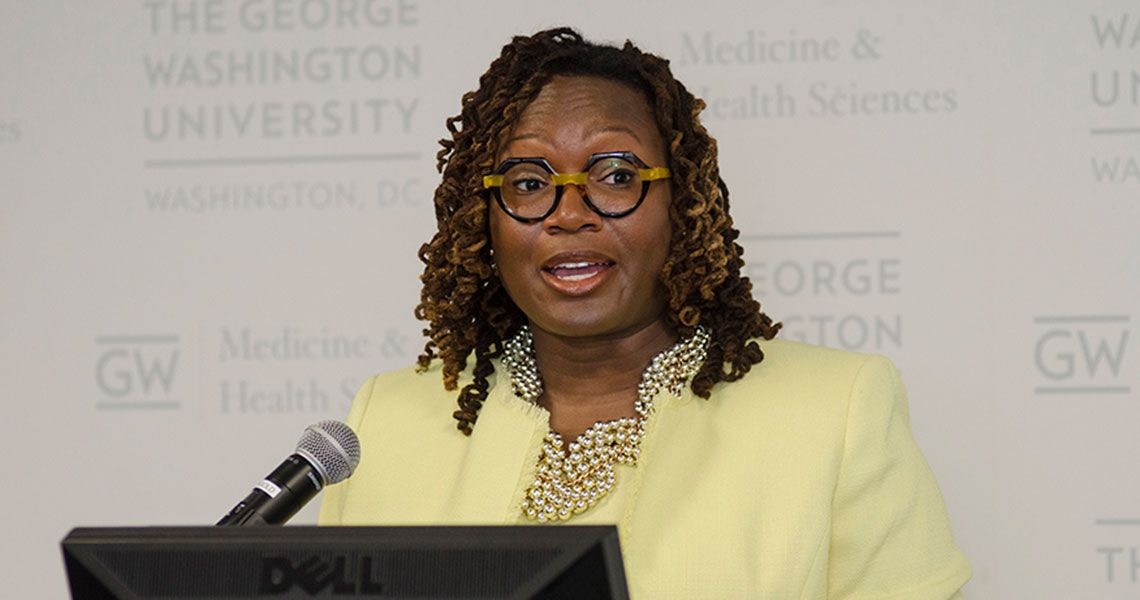Reflection, the act of serious thought or consideration, was the theme of the day June 14 as members of the Master Teacher Leadership Development Program (MTLDP) Cohort 15 gathered to celebrate their graduation from the program, which is offered by the George Washington University (GW) Graduate School of Education and Human Development in partnership with the GW School of Medicine and Health Sciences (SMHS).
“In Master Teacher, we don’t learn by doing, we learn by reflecting on what we have done,” said cohort member Andrea Anderson, MD, director of family medicine and core faculty member for the national family medicine residency at Unity Health Care, the first program graduate from that organization. “I’ve absolutely loved being part of the Master Teacher program. I learned so much about myself as a learner, a teacher, and a leader.”
Friends, family members, and colleagues from SMHS, Children’s National Health System (Children’s National, and the GW Columbian College of Arts and Sciences (CCAS) were in the audience to hear the students’ reflections on their time in the innovative, year-long development program, which includes curriculum focused on adult learning processes and their implications for teaching, curriculum design, qualitative research methods, and more.
Ellen Goldman, EdD ’05, MBA, assistant dean for faculty and curricular development in medical education and professor of clinical research and leadership at SMHS, listed three reasons the program is so special. “First, only about half of all United States medical schools have a formal organized faculty development fellowship program like MTLDP. Second, with some certificate programs, you get a piece of paper. With Master Teacher, you do get a piece of paper, but you also get 18 credits toward a master’s degree. And third, the graduates … worked really hard all year,” she said.
Faculty development at SMHS, added Jeffrey S. Akman, MD ’81, RESD ’85, vice president for health affairs, Walter A. Bloedorn Professor of Administrative Medicine, and dean of SMHS, “is about teaching, learning, mentorship, [and] faculty leadership.”
All of that is built into the MTLDP program, which Akman said has led members to go to on to run clerkships, residencies, and to be centrally involved in initiatives like the revision of the SMHS M.D. program curriculum.
Cohort 15 graduates included Anderson; Christine E. Briccetti, MD, assistant professor of pediatrics at SMHS; Kari Comer, MS, clinical educator in the Department of Speech, Language, and Hearing Sciences in CCAS; Pritha Ghosh, MD, assistant professor of neurology at SMHS; Ashleigh B. Harlow, BSN, nurse manager in the Cardiac Intensive Care Unit at Children’s National; Lisa E. Kenigsberg, MD, assistant professor of pediatrics at SMHS; Yolanda Lewis-Ragland, MD, assistant professor of pediatrics at SMHS; Steven Marek, MD, research instructor of pediatrics at SMHS; Michelle A. McGarry-Hansen, MD, PhD, assistant professor of pediatrics at SMHS; Lalit Narayan, MBBS, MA, visiting instructor of medicine at SMHS; Juan A. Reyes, MD ’04, MPH ’00, assistant professor of medicine at SMHS; and Jessica Ton, visiting instructor of obstetrics and gynecology at SMHS.
Comer, the first Columbian College graduate of the program, said she had a few goals going into the program: to enhance her teaching skills, develop leadership potential, and promote scholarship in the field of speech language pathology.
“I can say that I have met or am on the way to meeting all of these goals,” she said. “One of my biggest takeaways was in my redesign of using standardized patients for clinical methods, which is the clinical foundation for undergraduate students before they begin in-house clinical rotations.”
Master Teacher, she said, helped her better understand how to design an independent study to measure student learning and increase confidence, as well as the benefits of using standardized patients to prepare students for clinical practicums in the field of speech pathology.
Reyes said the program will help him succeed in one of his newer roles at GW: a faculty adviser for the Latin Medical Student Association. In addition, one effort he undertook as part of the program stood out: a pilot project exploring the effect using electronic medical records has on physicians, including the significant impact it has on their lives outside of work.
The graduates also took time to thank one another for their help and support throughout the year. “From Day 1 I felt like I found my tribe,” said Anderson. “And I’ll definitely miss my colleagues from Cohort 15.”



